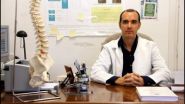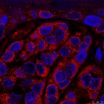(Press-News.org) Researchers from the University of Granada have discovered that colon cancer survivors are more likely to suffer future lesions related with pain in the back and lower abdomen than healthy individuals of the same gender and age.
These patients present a series of abnormalities in the abdominal wall architecture—the site of surgery in oncological treatment. Moreover, they have specific abnormalities in processing chronic pain that may increase their sensitization to any kind of pain in the future.
In two articles published in Pain Medicine and the European Journal of Cancer Care, University of Granada researchers from the Department of Physical Therapy analyse the physical and psychological status of colon cancer patients following oncological treatment. The study—funded by the Campus of International Excellence: BioHealth and Information & Communications Technology (CEI BioTic)—was conducted in collaboration with researchers from the Department of Surgery of the Hospital Clínico San Cecilio, Granada.
Third most frequent type of cancer
As principal author, Manuel Arroyo-Morales explains, "colon cancer is the third most common cancer in the world if we consider both genders together. Thanks to advances in oncological treatment, the chances of survival have risen spectacularly in recent years—between 44% and 65% in the last 5 years. This improvement in treatment has led to the appearance of a group of people who have had cancer and have managed to overcome it".
However, oncological treatment is extremely tough physically and highly traumatic psychologically. "The fact that this group of wrongly termed 'cancer survivors' should be growing leads us to ask what price they have to pay for their survival", says this University of Granada researcher.
The results indicate that when we compare these patients with individuals of a similar age and gender, we find that colon cancer survivors present a substantial deterioration of their functional capacity—that is, their capacity to lead normal daily work and leisure routines.
Loss of strength
This deterioration in functional capacity is due to their loss of physical condition because of physical rest during the treatment and convalescence that they have to undergo for several months. "The loss of parameters like muscle strength in the back or cardiorespiratory capacity can mean up to a 60% deterioration by comparison with healthy individuals of the same gender and age".
At the same time, colon cancer patients have symptoms like fatigue or moderate tiredness due to the illness itself. "All these physical abnormalities impact on their quality of life to the extent that this can be reduced by around 40% when compared with individuals of the same age and gender not affected by cancer", says Arroyo.
The University of Granada research group's next objective is to conduct physiotherapy programmes aimed at improving these physical issues and, thus, help colon cancer patients regain quality of life.
INFORMATION:
Follow this link to view a video about the study produced by the University of Granada Scientific Culture Unit: http://youtu.be/e9KyTn4hcSY
Colon cancer survivors are more likely to have pain in the back and abdomen
Researchers from the University of Granada discover that colon cancer patients experience abnormalities in processing chronic pain that increase their sensitization to pain of any kind in the future
2014-06-27
ELSE PRESS RELEASES FROM THIS DATE:
'Big data' technique improves monitoring of kidney transplant patients
2014-06-27
A new data analysis technique radically improves monitoring of kidney patients, according to a University of Leeds-led study, and could lead to profound changes in the way we understand our health.
The research, published in the journal PLoS Computational Biology, provides a way of making sense out of the huge number of clues about a kidney transplant patient's prognosis contained in their blood.
By applying sophisticated "big data" analysis to the samples, scientists were able to crunch hundreds of thousands of variables into a single parameter indicating how a kidney ...
Global healthcare is a labour of Hercules
2014-06-27
Einstein once observed that "it is harder to crack prejudice than an atom". If he was right, then Hans Rosling is faced with a labour of Hercules. As Professor of International Health at the Karolinska Institute in Stockholm, he finds himself fighting against the cliché that the world is divided between rich and poor. "This neat division simply no longer exists. The statistics reveal a far more complex picture, with more and more people worldwide living in relative prosperity. This means that in health research in particular it is time for a paradigm shift," says Rosling. ...
Sex hormone levels at midlife linked to heart disease risk in women
2014-06-27
PITTSBURGH, June 27, 2014 – As hormone levels change during the transition to menopause, the quality of a woman's cholesterol carriers degrades, leaving her at greater risk for heart disease, researchers at the University of Pittsburgh Graduate School of Public Health discovered.
The first-of-its-kind evaluation, supported by the National Institutes of Health (NIH), was done using an advanced method to characterize cholesterol carriers in the blood and is published in the July issue of the Journal of Lipid Research.
The results call for further research to evaluate ...
New form of brain signaling affects addiction-related behavior
2014-06-27
University of Iowa researchers have discovered a new form of neurotransmission that influences the long-lasting memory created by addictive drugs, like cocaine and opioids, and the subsequent craving for these drugs of abuse. Loss of this type of neurotransmission creates changes in brains cells that resemble the changes caused by drug addiction.
The findings, published June 22 in the journal Nature Neuroscience, suggest that targeting this type of neurotransmission might lead to new therapies for treating drug addiction.
"Molecular therapies for drug addiction are ...
Homeless alcoholics typically began drinking as children
2014-06-27
WASHINGTON — A phenomenological study offers detailed insights into homeless, alcohol-dependent patients often stigmatized by the public and policymakers as drains on the health care system, showing the constellation of reasons they are incapable of escaping social circumstances that perpetuate and exacerbate their problems The study, published online yesterday in Annals of Emergency Medicine, was conducted at Bellevue Hospital in New York City, which has a long history of service to the city's indigent population.
"One hundred percent of patients enrolled in the study ...
CNIO researchers discover more than 40 melanoma-specific genes that determine aggressiveness
2014-06-27
Researchers from the Spanish National Cancer Research Centre (CNIO) have discovered more than 40 genes that predict the level of aggressiveness of melanoma and that distinguish it from other cancers with a poor prognosis. The discovery, published in Cancer Cell, will help to identify unique aspects of melanoma that could contribute to determine the risk of developing metastasis in patients with this disease. This study is relevant because it explains why a drug, also described by CNIO, is being used to selectively attack the melanoma tumour cells. Melanoma is one of the ...
NIH scientists establish proof-of-concept for host-directed tuberculosis therapy
2014-06-27
WHAT:
In a new study published in Nature, scientists describe a new type of tuberculosis (TB) treatment that involves manipulating the body's response to TB bacteria rather than targeting the bacteria themselves, a concept called host-directed therapy. TB remains a major cause of disability and death worldwide as an estimated 8.6 million people fell ill with TB and 1.3 million people died from the disease in 2012, according to the World Health Organization. Although TB is curable, adherence to therapy is difficult as treatment requires taking antibiotic drugs for at least ...
Walking the rocks: GSA Today article studies undergraduate field education
2014-06-27
Boulder, Colorado, USA – In the July 2014 issue of GSA Today, Heather Petcovic of Western Michigan University and colleagues Alison Stokes and Joshua Caulkins examine the question of geoscientists' perceptions of the value of undergraduate field education. Despite being perceived as integral to both geoscience learning and professional preparation, little research exists on the types of field experiences that carry the most value.
In their study, Petcovic and colleagues compile and analyze survey data obtained during two Geological Society of America (GSA) annual meetings ...
Research provides new theory on cause of ice age 2.6 million years ago
2014-06-27
New research published today (Friday 27th June 2014) in the journal Nature Scientific Reports has provided a major new theory on the cause of the ice age that covered large parts of the Northern Hemisphere 2.6 million years ago.
The study, co-authored by Dr Thomas Stevens, from the Department of Geography at Royal Holloway, University of London, found a previously unknown mechanism by which the joining of North and South America changed the salinity of the Pacific Ocean and caused major ice sheet growth across the Northern Hemisphere.
The change in salinity encouraged ...
Scientists identify new pathogenic and protective microbes associated with severe diarrhea
2014-06-27
In a finding that may one day help control a major cause of death among children in developing countries, a team of researchers led by faculty from the University of Maryland, College Park and the University of Maryland School of Medicine has identified microorganisms that may trigger diarrheal disease and others that may protect against it. These microbes were not widely linked to the condition previously.
"We were able to identify interactions between microbiota that were not previously observed, and we think that some of those interactions may actually help prevent ...
LAST 30 PRESS RELEASES:
Pekingese, Shih Tzu and Staffordshire Bull Terrier among twelve dog breeds at risk of serious breathing condition
Selected dog breeds with most breathing trouble identified in new study
Interplay of class and gender may influence social judgments differently between cultures
Pollen counts can be predicted by machine learning models using meteorological data with more than 80% accuracy even a week ahead, for both grass and birch tree pollen, which could be key in effective
Rewriting our understanding of early hominin dispersal to Eurasia
Rising simultaneous wildfire risk compromises international firefighting efforts
Honey bee "dance floors" can be accurately located with a new method, mapping where in the hive forager bees perform waggle dances to signal the location of pollen and nectar for their nestmates
Exercise and nutritional drinks can reduce the need for care in dementia
Michelson Medical Research Foundation awards $750,000 to rising immunology leaders
SfN announces Early Career Policy Ambassadors Class of 2026
Spiritual practices strongly associated with reduced risk for hazardous alcohol and drug use
Novel vaccine protects against C. diff disease and recurrence
An “electrical” circadian clock balances growth between shoots and roots
Largest study of rare skin cancer in Mexican patients shows its more complex than previously thought
Colonists dredged away Sydney’s natural oyster reefs. Now science knows how best to restore them.
Joint and independent associations of gestational diabetes and depression with childhood obesity
Spirituality and harmful or hazardous alcohol and other drug use
New plastic material could solve energy storage challenge, researchers report
Mapping protein production in brain cells yields new insights for brain disease
Exposing a hidden anchor for HIV replication
Can Europe be climate-neutral by 2050? New monitor tracks the pace of the energy transition
Major heart attack study reveals ‘survival paradox’: Frail men at higher risk of death than women despite better treatment
Medicare patients get different stroke care depending on plan, analysis reveals
Polyploidy-induced senescence may drive aging, tissue repair, and cancer risk
Study shows that treating patients with lifestyle medicine may help reduce clinician burnout
Experimental and numerical framework for acoustic streaming prediction in mid-air phased arrays
Ancestral motif enables broad DNA binding by NIN, a master regulator of rhizobial symbiosis
Macrophage immune cells need constant reminders to retain memories of prior infections
Ultra-endurance running may accelerate aging and breakdown of red blood cells
Ancient mind-body practice proven to lower blood pressure in clinical trial
[Press-News.org] Colon cancer survivors are more likely to have pain in the back and abdomenResearchers from the University of Granada discover that colon cancer patients experience abnormalities in processing chronic pain that increase their sensitization to pain of any kind in the future


